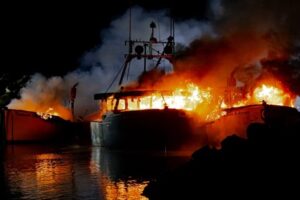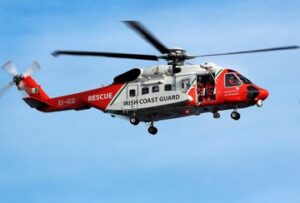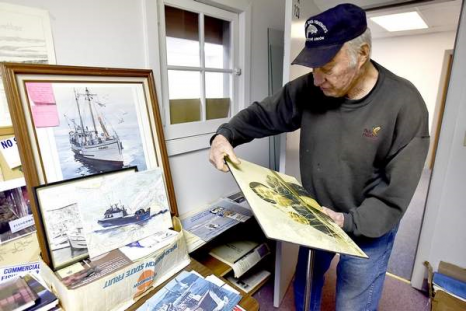Tag Archives: seismic testing
Seismic blasting, oil & gas drilling in Atlantic? Now’s the time to comment
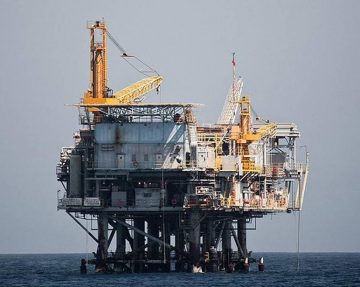 The public is now being asked to comment on the president’s proposal to open up the Atlantic and all other federal offshore planning areas for potential oil and gas drilling. Interior Secretary Ryan Zinke and President Donald Trump announced Thursday that the 45-day public comment period on a new Five-Year National Offshore Oil and Gas Leasing Program on the Outer Continental Shelf will begin Monday. The comment period will close Aug. 17. To comment on the proposed Five-Year National Offshore Oil and Gas Leasing Program: click here to read the story, scroll down page for instructions. 08:43
The public is now being asked to comment on the president’s proposal to open up the Atlantic and all other federal offshore planning areas for potential oil and gas drilling. Interior Secretary Ryan Zinke and President Donald Trump announced Thursday that the 45-day public comment period on a new Five-Year National Offshore Oil and Gas Leasing Program on the Outer Continental Shelf will begin Monday. The comment period will close Aug. 17. To comment on the proposed Five-Year National Offshore Oil and Gas Leasing Program: click here to read the story, scroll down page for instructions. 08:43
FISH-NL calls on C-NLOPB to suspend seismic work in light of potential impact on basis of marine food chain
 The Federation of Independent Sea Harvesters of Newfoundland and Labrador (FISH-NL) has requested that the Canada-Newfoundland and Labrador Offshore Petroleum Board (C-NLOPB) immediately suspend seismic work off Newfoundland and Labrador in light of a new study that found the intense acoustic signals may damage critical elements of the marine food chain. “With most commercial fish stocks at or near critical levels our first priority must be the health of our renewable marine resources,” says Ryan Cleary, President of FISH-NL, who made the request Thursday in a letter to Scott Tessier, chair and executive officer of the C-NLOPB. “The potential impact of seismic testing on the marine environment — combined with a potential conflict of interest in which the best interests of inshore harvesters may not be represented — should compel the C-NLOPB to act,” Cleary wrote in the letter. click here to read the press release 08:59
The Federation of Independent Sea Harvesters of Newfoundland and Labrador (FISH-NL) has requested that the Canada-Newfoundland and Labrador Offshore Petroleum Board (C-NLOPB) immediately suspend seismic work off Newfoundland and Labrador in light of a new study that found the intense acoustic signals may damage critical elements of the marine food chain. “With most commercial fish stocks at or near critical levels our first priority must be the health of our renewable marine resources,” says Ryan Cleary, President of FISH-NL, who made the request Thursday in a letter to Scott Tessier, chair and executive officer of the C-NLOPB. “The potential impact of seismic testing on the marine environment — combined with a potential conflict of interest in which the best interests of inshore harvesters may not be represented — should compel the C-NLOPB to act,” Cleary wrote in the letter. click here to read the press release 08:59
NOAA sets table for seismic testing offshore, including off South Carolina
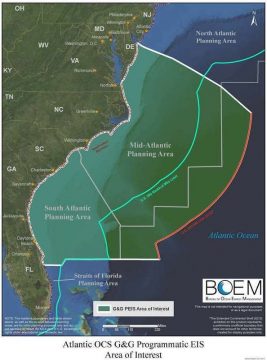 The Trump administration took a big step Monday toward permitting seismic testing for the presence of oil and natural gas in the offshore Atlantic, issuing the rules for how the tests take place. The tests would provide data sold to drilling companies to locate where to drill test wells. The move had been expected after President Donald Trump in April ordered a review of the Obama administration’s closings and lease denials of potential new offshore drilling sites.,, “Why would the government even think about allowing the filthy, accident-prone oil industry to proceed with this dangerous procedure that so greatly affects the same wildlife we’re all trying to protect through restrictive fishing regulations?” asked Rick Baumann, the owner of Murrells Inlet Seafood. click here to read the story 21:14
The Trump administration took a big step Monday toward permitting seismic testing for the presence of oil and natural gas in the offshore Atlantic, issuing the rules for how the tests take place. The tests would provide data sold to drilling companies to locate where to drill test wells. The move had been expected after President Donald Trump in April ordered a review of the Obama administration’s closings and lease denials of potential new offshore drilling sites.,, “Why would the government even think about allowing the filthy, accident-prone oil industry to proceed with this dangerous procedure that so greatly affects the same wildlife we’re all trying to protect through restrictive fishing regulations?” asked Rick Baumann, the owner of Murrells Inlet Seafood. click here to read the story 21:14
Interior Secretary Ryan Zinke – Keep Offshore Oil Drilling and Seismic Testing Away From the Atlantic Coast
 On April 6 Interior Secretary Ryan Zinke told the National Ocean Industries Association that an executive order was forthcoming that would start the process of rewriting the five-year plan for the Outer Continental Shelf Oil and Gas Leasing Program. The next day an op-ed in Morning Consult by Carl Bentzel began Big Oil’s public relations campaign to paint oil/gas exploration and drilling off the Atlantic coast as safe and oil-spill free given new technology and safeguards. Mr. Bentzel argues that the “first steps should be responsible assessment of oil and gas resources in our South Atlantic Ocean.” So let’s start with seismic airgun blasting that is the essence of this exploration. While proponents of seismic testing say the process is safe for marine life and will provide information for a public debate, neither point is factual. click here to read the op-ed 09:17
On April 6 Interior Secretary Ryan Zinke told the National Ocean Industries Association that an executive order was forthcoming that would start the process of rewriting the five-year plan for the Outer Continental Shelf Oil and Gas Leasing Program. The next day an op-ed in Morning Consult by Carl Bentzel began Big Oil’s public relations campaign to paint oil/gas exploration and drilling off the Atlantic coast as safe and oil-spill free given new technology and safeguards. Mr. Bentzel argues that the “first steps should be responsible assessment of oil and gas resources in our South Atlantic Ocean.” So let’s start with seismic airgun blasting that is the essence of this exploration. While proponents of seismic testing say the process is safe for marine life and will provide information for a public debate, neither point is factual. click here to read the op-ed 09:17
Study: Seismic Testing Disrupts Fish Behavior
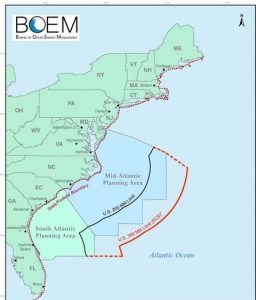 Almost anyone who’s thrown a hook in the water to catch a fish in a quiet atmosphere probably knows intuitively that loud noises spook them: you don’t scream at fish to bite, after all, you wait patiently. But intuition isn’t science, and seismic airguns don’t make just any loud noise, so when University of North Carolina Institute of Marine Sciences doctoral student Avery Paxton and some colleagues got the opportunity to do some real science on an issue that’s germane to the hot topic of oil and gas exploration by seismic surveys, they jumped at the chance. What they found, back in September 2014 when they did a study during a U.S. Geological Survey seismic mapping effort in the Atlantic Ocean off Beaufort Inlet, not only confirmed intuition, but surprised them in its degree: 78 percent of the fish on a reef near the seismic survey “went missing,” compared to counts at the same time the three previous days during the evening hours, the peak time for fish, such as snapper, grouper and angelfish, to gather there. Continue reading the article here 10:27
Almost anyone who’s thrown a hook in the water to catch a fish in a quiet atmosphere probably knows intuitively that loud noises spook them: you don’t scream at fish to bite, after all, you wait patiently. But intuition isn’t science, and seismic airguns don’t make just any loud noise, so when University of North Carolina Institute of Marine Sciences doctoral student Avery Paxton and some colleagues got the opportunity to do some real science on an issue that’s germane to the hot topic of oil and gas exploration by seismic surveys, they jumped at the chance. What they found, back in September 2014 when they did a study during a U.S. Geological Survey seismic mapping effort in the Atlantic Ocean off Beaufort Inlet, not only confirmed intuition, but surprised them in its degree: 78 percent of the fish on a reef near the seismic survey “went missing,” compared to counts at the same time the three previous days during the evening hours, the peak time for fish, such as snapper, grouper and angelfish, to gather there. Continue reading the article here 10:27
Feds Take Controversial Mid and South Atlantic Seismic Air Gun Testing Off Table
 Federal officials announced on Friday a controversial plan to allow dangerous seismic air gun testing in a vast section off the mid-Atlantic coast including an area as close as 20 miles off the coast of Ocean City has been removed from consideration. With a proposal to lease a vast area totaling roughly three million acres off the mid-Atlantic coast to offshore drilling for oil and natural gas reserves already taken off the table last spring, the federal Bureau of Ocean Energy Management (BOEM) announced on Friday a companion plan to open the same area to seismic airgun testing has been denied. Seismic airgun testing is used to determine what oil and natural gas reserves lie beneath the ocean floor. However, once the plan to allow offshore drilling off the mid-Atlantic coast was removed from consideration, at least for the next five years, BOEM officials determined there was no good reason to allow potentially dangerous seismic testing in the same areas off the mid-Atlantic coast including Ocean City and Assateague, for example. Read the story here 10:12
Federal officials announced on Friday a controversial plan to allow dangerous seismic air gun testing in a vast section off the mid-Atlantic coast including an area as close as 20 miles off the coast of Ocean City has been removed from consideration. With a proposal to lease a vast area totaling roughly three million acres off the mid-Atlantic coast to offshore drilling for oil and natural gas reserves already taken off the table last spring, the federal Bureau of Ocean Energy Management (BOEM) announced on Friday a companion plan to open the same area to seismic airgun testing has been denied. Seismic airgun testing is used to determine what oil and natural gas reserves lie beneath the ocean floor. However, once the plan to allow offshore drilling off the mid-Atlantic coast was removed from consideration, at least for the next five years, BOEM officials determined there was no good reason to allow potentially dangerous seismic testing in the same areas off the mid-Atlantic coast including Ocean City and Assateague, for example. Read the story here 10:12
South Atlantic Region Offshore oil surveys to start as seismic testing opposition grows
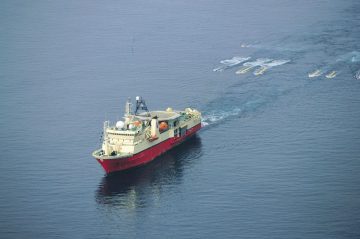 Nearly a half million commercial fishing families have joined the opposition to seismic testing for oil and natural gas in the Atlantic Ocean, according to a South Carolina-based business chamber. Meanwhile, a first, non-seismic survey is set to start. The families, numbering more than 400,000, are part of a coastal residents and business movement that has coalesced into the tens of thousands in South Carolina alone. More than 100 Atlantic coastal communities, thousands of businesses and more than 1,000 elected officials also have called on President Barack Obama to stop the testing, according to South Carolina Small Business Chamber of Commerce and Oceana, an environmental advocate. Meanwhile the federal Bureau of Ocean Energy Management continues to process permit applications from seven probe applicants, including six that want to search in waters off South Carolina. “BOEM is currently in the process of reviewing those permits. Before the permits can be issued, careful environmental analysis is done to ensure the safety of the marine ecosystem,” spokeswoman Caryl Fagot said. Read the story here 09:26
Nearly a half million commercial fishing families have joined the opposition to seismic testing for oil and natural gas in the Atlantic Ocean, according to a South Carolina-based business chamber. Meanwhile, a first, non-seismic survey is set to start. The families, numbering more than 400,000, are part of a coastal residents and business movement that has coalesced into the tens of thousands in South Carolina alone. More than 100 Atlantic coastal communities, thousands of businesses and more than 1,000 elected officials also have called on President Barack Obama to stop the testing, according to South Carolina Small Business Chamber of Commerce and Oceana, an environmental advocate. Meanwhile the federal Bureau of Ocean Energy Management continues to process permit applications from seven probe applicants, including six that want to search in waters off South Carolina. “BOEM is currently in the process of reviewing those permits. Before the permits can be issued, careful environmental analysis is done to ensure the safety of the marine ecosystem,” spokeswoman Caryl Fagot said. Read the story here 09:26
Opinion: Stop the Obama administration from destroying our coastal economy
 The Obama Administration is very close to unleashing an underwater sonic boom attack off our Atlantic Coast, including South Carolina’s. You probably have two immediate questions. What am I talking about? And why should you care? First, a sonic boom is how Richard Viso, a professor in the Coastal Environment School at Coastal Carolina University, describes seismic testing. Seismic testing is a highly dangerous process that uses intense airgun blasting to send extremely loud sound waves miles below the seafloor in a hunt for oil deposits. One seismic testing vessel can tow up to 96 airguns, which can cover an area 21 times larger than the National Mall in Washington. These sonic booms, which can be heard for thousands of miles underwater, are repeated every 10 to 12 seconds, creating one of the loudest noises in the oceans. Seismic testing under just one lease can go on for up to an entire year. The Obama Administration’s Department of Interior is set to issue up to 9 seismic testing permits because oil companies don’t share information. Read the story here 11:37
The Obama Administration is very close to unleashing an underwater sonic boom attack off our Atlantic Coast, including South Carolina’s. You probably have two immediate questions. What am I talking about? And why should you care? First, a sonic boom is how Richard Viso, a professor in the Coastal Environment School at Coastal Carolina University, describes seismic testing. Seismic testing is a highly dangerous process that uses intense airgun blasting to send extremely loud sound waves miles below the seafloor in a hunt for oil deposits. One seismic testing vessel can tow up to 96 airguns, which can cover an area 21 times larger than the National Mall in Washington. These sonic booms, which can be heard for thousands of miles underwater, are repeated every 10 to 12 seconds, creating one of the loudest noises in the oceans. Seismic testing under just one lease can go on for up to an entire year. The Obama Administration’s Department of Interior is set to issue up to 9 seismic testing permits because oil companies don’t share information. Read the story here 11:37
Feds halt South Atlantic offshore drilling leases , but not seismic testing
 There were public expressions of surprise, relief and victory from environmental groups and local officials after the U.S. Department of Interior’s March 15 announcement that there would be no offshore drilling leases in the Atlantic Ocean for the 2017-2022 period. But for drilling opponents and environmental advocates, that celebration has been tempered somewhat by news that, even without drilling, the process of awarding permits for seismic testing in the Atlantic will go ahead — and could lead to such testing later this year. Read the rest here 13:07
There were public expressions of surprise, relief and victory from environmental groups and local officials after the U.S. Department of Interior’s March 15 announcement that there would be no offshore drilling leases in the Atlantic Ocean for the 2017-2022 period. But for drilling opponents and environmental advocates, that celebration has been tempered somewhat by news that, even without drilling, the process of awarding permits for seismic testing in the Atlantic will go ahead — and could lead to such testing later this year. Read the rest here 13:07
Bipartisan group opposes oil exploration off Georgia
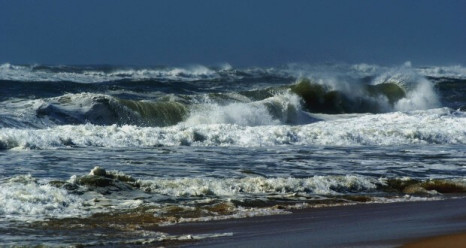 Led by U.S. Reps Mark Sanford, R-S.C., and Bobby Scott, D-Va., a bipartisan group of 33 house members last week sent a letter to the Bureau of Ocean Energy Management opposing seismic testing for offshore oil. U.S. Rep. Buddy Carter, the Republican freshman whose district spans the Georgia Coast, did not sign on. The letter requested a halt to the permitting and review process for potential seismic testing in the Atlantic Ocean from Virginia through Georgia. Read the article here 16:45
Led by U.S. Reps Mark Sanford, R-S.C., and Bobby Scott, D-Va., a bipartisan group of 33 house members last week sent a letter to the Bureau of Ocean Energy Management opposing seismic testing for offshore oil. U.S. Rep. Buddy Carter, the Republican freshman whose district spans the Georgia Coast, did not sign on. The letter requested a halt to the permitting and review process for potential seismic testing in the Atlantic Ocean from Virginia through Georgia. Read the article here 16:45
Rutgers University Seismic testing ends off the New Jersey Shore
 Seismic testing that involved blasting the ocean floor off the New Jersey Shore with sound waves has been completed, and a lawsuit brought against it by fishing groups has been dismissed. Five fishing groups had sued to stop the research, led by Rutgers University and involving the National Science Foundation and the University of Texas, claiming it disturbs and possibly harms marine life such as dolphins, whales, turtles, and many fish species. Read the rest here 09:14
Seismic testing that involved blasting the ocean floor off the New Jersey Shore with sound waves has been completed, and a lawsuit brought against it by fishing groups has been dismissed. Five fishing groups had sued to stop the research, led by Rutgers University and involving the National Science Foundation and the University of Texas, claiming it disturbs and possibly harms marine life such as dolphins, whales, turtles, and many fish species. Read the rest here 09:14Seismic testing off Clyde River cancelled for summer
 Clyde River, Nunavut, is declaring victory after an energy company cancelled this summer’s plans for offshore seismic testing. “I’m very happy about it,” said Jerry Natanine, mayor of the hamlet on Baffin Island’s east coast that strongly opposed the seismic plans. The program is strongly opposed by the people of Clyde River, which argued before the board that the testing would disturb or harm seals, whales, walrus and other marine mammals locals depend on for food. Read the rest here 14:41
Clyde River, Nunavut, is declaring victory after an energy company cancelled this summer’s plans for offshore seismic testing. “I’m very happy about it,” said Jerry Natanine, mayor of the hamlet on Baffin Island’s east coast that strongly opposed the seismic plans. The program is strongly opposed by the people of Clyde River, which argued before the board that the testing would disturb or harm seals, whales, walrus and other marine mammals locals depend on for food. Read the rest here 14:41
New Jersey Seismic-testing debate continues amid NOAA/NMFS approvals
 A research project green-lighted to begin off the New Jersey coast this summer is the source of concern for legislators and environmentalists who see the project’s use of seismic testing as a potential threat to marine life and the commercial fishing industry. “It was a bad idea for the NOAA [National Oceanic and Atmospheric Administration] to allow for seismic testing off the Jersey Shore last year, and it’s a bad idea this year,” Read the rest here 07:31
A research project green-lighted to begin off the New Jersey coast this summer is the source of concern for legislators and environmentalists who see the project’s use of seismic testing as a potential threat to marine life and the commercial fishing industry. “It was a bad idea for the NOAA [National Oceanic and Atmospheric Administration] to allow for seismic testing off the Jersey Shore last year, and it’s a bad idea this year,” Read the rest here 07:31
Seismic testing off NJ coast close to start despite opposition
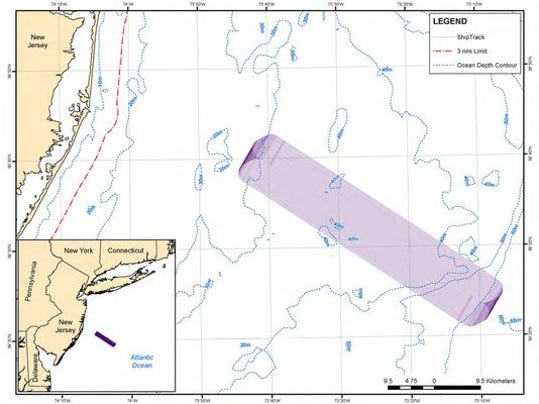 A Rutgers University professor is going full speed ahead with a seismic study of the ocean floor, despite flags raised by oppositional legislatures, a state agency and environmentalists. Legislatures went above him Friday and appealed to Rutgers University President Robert Barch urging him to stop the study that could begin in June. “I don’t understand the rancor that has developed. I’m doing basic research of sea level history. We’re trying to preserve our coastline by understanding how it behaves during sea level rise,” Mountain said. Read the rest here 09:27
A Rutgers University professor is going full speed ahead with a seismic study of the ocean floor, despite flags raised by oppositional legislatures, a state agency and environmentalists. Legislatures went above him Friday and appealed to Rutgers University President Robert Barch urging him to stop the study that could begin in June. “I don’t understand the rancor that has developed. I’m doing basic research of sea level history. We’re trying to preserve our coastline by understanding how it behaves during sea level rise,” Mountain said. Read the rest here 09:27
Rick Baumann writes, Is seismic testing, drilling for oil necessary?
From the letter: i.e. – our commercial fishermen have been and are being heavily regulated right now by the Precautionary Principle because conservative lawmakers won’t fund real time quantification of those resources. The “best available science” is way out of date – so precautionary regulations were put in place to protect the resources – even though little or no real time science existed to justify them. Why shouldn’t the same principle be applied when it comes to Atlantic drilling? Read more here 09:05
Seismic testing approved — over Inuit opposition — for Canada’s eastern Arctic
The project is planned by an international consortium of three mining companies under the umbrella name Multi-Klient Invest, or MKI. The seismic tests involve towing an air gun behind a ship up and down the waters of Baffin Bay and Davis Strait, off Baffin Island’s east coast. Read more here 18:22
Is Decline in Snow Crab Caused by 2002 Seismic Testing?
![]() The Margaree Environmental Association (MEA) is concerned that the crab fishery cutbacks in the , along the shores of Cape Breton Island, due to the decline in the crab population, may have been caused by seismic testing which was carried out in this area in late 2002. Read more here 16:56
The Margaree Environmental Association (MEA) is concerned that the crab fishery cutbacks in the , along the shores of Cape Breton Island, due to the decline in the crab population, may have been caused by seismic testing which was carried out in this area in late 2002. Read more here 16:56
Then, this: Seismic survey will give Statoil better handle on Bay du Nord find Read more here 17:03
Jersey Shore fishing: Seismic blasting to begin June 3 unless opposition prevails
 Just what effect seismic testing will have along the Jersey Shore is in question, but it seems that almost everyone except the Obama Administration is opposed to taking a chance on any negative consequences resulting from it during a study that hardly appears to be of high priority. Read more here 21:45
Just what effect seismic testing will have along the Jersey Shore is in question, but it seems that almost everyone except the Obama Administration is opposed to taking a chance on any negative consequences resulting from it during a study that hardly appears to be of high priority. Read more here 21:45
Guest column: Warnings about seismic testing, Neil A. Armingeon of St. Augustine
 The noise is constant, every 16 seconds, 24 hour a day, for weeks on end. Could you read? Communicate with your family? This isn’t science fiction. It could happen near our beaches and our coastal waters. The oil and gas industry want to map oil and gas reserves off the Atlantic coast. To do that, it needs seismic airgun testing. The Deepwater Horizon oil spill taught us there is no such thing as clean oil and gas production. Read more here 16:29
The noise is constant, every 16 seconds, 24 hour a day, for weeks on end. Could you read? Communicate with your family? This isn’t science fiction. It could happen near our beaches and our coastal waters. The oil and gas industry want to map oil and gas reserves off the Atlantic coast. To do that, it needs seismic airgun testing. The Deepwater Horizon oil spill taught us there is no such thing as clean oil and gas production. Read more here 16:29
The good and bad of seismic testing. (the good?)
The controversy over seismic testing has come to the Cape Fear region, with Kure Beach’s mayor writing a letter in support and the Carolina Beach Town Council voting recently to oppose it. Read more here 12:18
Judge: NMFS Erred in Beluga Whale Estimates, Maybe the 18 Beluga’s waiting for import permit approval would give them a benchmark!
JUNEAU- A federal judge says the National Marine Fisheries Service made mathematical errors in estimating how many endangered beluga whales in Cook Inlet could be harmed or harassed by seismic testing. continued The National Marine Fisheries Service (NMFS), is the agency responsible for approving the beluga permit to import 18 Beluga’s from Russia, captured in Russia’s Sea of Okhotsk.
Dispute rages on over low energy seismic testing – former vice president of the Port San Luis Commercial Fishermen’s Association – lack of an environmental impact report
The former vice president of the Port San Luis Commercial Fishermen’s Association is resigning over PG&E’S fault line surveys near Diablo Canyon. He claims some of those tests were carried out without the proper permits and said he’s owed compensation for lost catches during the two year low energy testing From 2010 to 2012, low energy testing was completed in the waters off Port San Luis and Morro Bay. The information was used to measure the seismicity surrounding Diablo Canyon Nuclear Power Plant. According to the now former vice president Brian Stacey, the testing should have required an environmental impact report but was approved without one. Read More






 Recent months have brought much discussion and debate about the effects of seismic surveying along the Atlantic Coast as the federal government has approved consideration of permits for seismic operations. Numerous allegations from non-governmental organizations (NGOs) assert that seismic surveys are harmful to marine life and threaten fishing and tourism. These allegations are simply false.
Recent months have brought much discussion and debate about the effects of seismic surveying along the Atlantic Coast as the federal government has approved consideration of permits for seismic operations. Numerous allegations from non-governmental organizations (NGOs) assert that seismic surveys are harmful to marine life and threaten fishing and tourism. These allegations are simply false. 






























